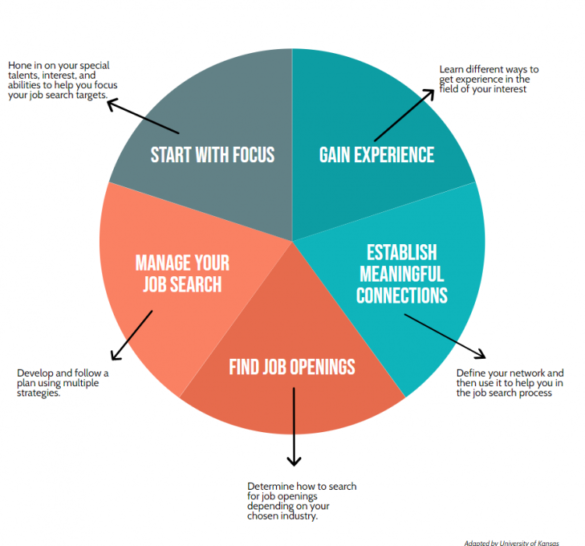
Job Search & Job Offers
-
JOB SEARCH

Job searching isn’t just about applying for jobs and hoping to get called for an interview anymore. Few people are able to simply put in an application, get an interview, and land a job in today’s competitive, network-driven job market. The most successful job seekers utilize a variety of strategies, from establishing a social presence to targeting companies, to help them stand out from the crowd.
Perhaps the most important part of formulating a job search strategy is to figure out not just what kind of job you want, but what type—full-time, part-time, freelance, remote, a combination of on-site and remote, etc.
What type of company do you want to work for—a nonprofit, an agency, a firm in a specific industry, a small company, a large corporation, etc.? Do you need a traditional 9-to-5 schedule, or do want alternative hours where you work late or overnight? Do you want to work on the weekends, or only Monday through Friday?
Figuring all of these things out before you start your search will help guide your job search plan more effectively.
A portfolio is essentially samples of your work. This can include links to articles you’ve written, screenshots of a project you completed, a report you compiled, a video you created, and more. Depending on the type of role you’re seeking, having samples of your work will be more requested or less requested.
For example, a graphic designer or a writer will definitely need examples to work they’ve created, while a sales professional may not be requested to provide any samples.
Portfolios can be a personal website, a splash page such as About.me, or even a section on your LinkedIn profile. Take this opportunity to shine a spotlight on your personal brand and what makes you a unique candidate.
There’s a reason you hear this tip over and over again. If you’re simply swapping out the job title and company name in your cover letter and sending it off, you’re doing it wrong.
Many companies now use applicant tracking systems (ATS) to filter qualified and non-qualified candidates. You have to include keywords that are relevant to your title and industry in any online applications. You should also closely follow the formatting instructions when submitting your resume through an applicant tracking system.
Don’t upload any materials until you’ve verified the exact requirements, or else the online system may not be able to properly register them.
If you make it past the ATS and your application is in front of human eyes, the hiring manager will be looking for signs that you researched the company and that you are truly interested this particular role. Include reasons for why you want to work at this company and in this role. Tell them what they will stand to gain if they hire you.
» For more information & help on Resumes & Cover letters click on the link below ↓
An informational interview may sound intimidating, but it doesn’t have to be. It’s a unique way to expand your network and potentially meet with people working at your desired company, making it an effective job search strategy that can also build your network. Try reaching out to someone via LinkedIn or email to see if they would have 20 or 30 minutes to sit down for a cup of coffee to discuss their job or their company.
To be clear, an informational interview isn’t a time to ask someone for a recommendation or for a job. It’s simply to gain information and create a new contact.
» For more information & help on Informational Interviews click on the link below ↓
Many recruiters are on LinkedIn, and it’s likely your profile will be viewed by a prospective employer. The first step to optimizing your LinkedIn profile is to fill out as many sections as you can. Upload a professional photo without any social media filters. Write a headline and summary using common keywords in your industry. Fill out your employment history and add skills.
Once you’ve completed your profile, you have to keep up with it. The best way to show up in recruiters’ feeds and stay top of mind is to share updates and articles and to comment and interact on other’s posts. Use hashtags to make your posts searchable. Share articles related to your industry and even consider joining groups.
Using large job boards can provide a great way to find a wide swath of jobs and to maybe even discover new companies hiring in your area. But, consider more focused job boards to help narrow your search and provide better results.
Find out if there are job boards geared toward your industry or specific job.
» For more information Job Opportunities click on the link below ↓
Take advantage of networking opportunities. The more you engage in targeted networking, the more real connections you will make that could produce sustainable leads.
While networking is always a useful job search strategy, to make it more effective be sure to look into industry events and professional associations that align more closely to your skill set. Often these events are held weekly or monthly, allowing a more natural way to network since you’ll have the opportunity to see people regularly and not just at a one-time event. And there’s a good chance that these events may have a virtual option, too.
» For more information & help on Networking click on the link below ↓
NEGOTIATING
JOB OFFERS
The point of using dummy text for your paragraph is that it has a more-or-less normal distribution of letters. making it look like readable English.
Salary negotiations are discussions between yourself and a representative of your current or prospective company that aim to help you secure a higher salary.
It doesn’t matter if you’re a long-time employee or a new hire: if you feel that your salary isn’t enough, you should feel empowered to negotiate in order to get what you deserve.
When you decide that you want to negotiate for a better salary, be prepared to:
- Build your case: You will need to prove that you are worth investing in, with specific examples of value you’ve given to employers in your career.
- Face some resistance: Even air-tight cases for a salary increase can face resistance, so be prepared to answer questions, especially, “Why do you deserve this salary?”
- Strike a Balance Between Firm and Flexible: Your salary negotiations won’t go well if you refuse to give any ground or say “yes” to a minimal salary increase. Be prepared to go back-and-forth during negotiations and be sure that any compromise reached is acceptable.
ADDITIONAL RESOURCES
CURRENT OPPORTUNITIES
QUESTIONS?

FEEDBACK WELCOME: Please share your comments and insights regarding this new site with info-education@cowcreek.com.
SEARCH
CONTACT US
2371 NE Stephens Street Suite #100
Roseburg, OR 97470
Email: info-education@cowcreek-nsn.gov
Phone: 541.677.5575
Fax: 541.677.5574
© 2020 COW CREEK BAND OF UMPQUA TRIBE OF INDIANS. ALL RIGHTS RESERVED
